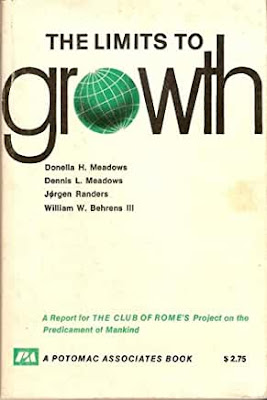If you read these postings with any regularity, you may well have noticed our admiration for the work of Donella Meadows, particularly her authorship of Limits to Growth back in 1972. Subsequent updates were published in 1992 (Beyond the Limits) and 2004 (Limits to Growth: The 30-Year Update). This morning we were both pleasantly surprised to discover someone has again updated the input to the computer models underlying Limits and dismayed by the results found in Update to Limits to Growth: Comparing the World3 Model with Empirical Data
I conducted a data update to Limits to Growth (LtG), best known from the 1972 bestseller that forecasted a scenario of global societal collapse occurring around the present time if humanity did not alter its priorities. Empirical data comparisons since then indicated that the world was still heading for collapse. My objectives were to examine whether this was still the case based on the most recent data, and whether there was opportunity left to change that trajectory. My research benefited from improved data availability, and included a scenario and two variables that had not been part of previous comparisons. I collected data from academia, (non- )government agencies, United Nations entities, and the World Bank. This was plotted along four LtG scenarios spanning a range of technological, resource, and societal assumptions. From these graphs and two quantitative accuracy measures, I found that the scenarios aligned closely with observed global data, which is a testament to the LtG work done decades ago. The two scenarios aligning most closely indicate a halt in growth over the next decade or so, which puts into question the usability of continuous growth as humanity’s goal in the 21st century. Both scenarios also indicate subsequent declines, but only one—the scenario in which declines are caused by pollution, including greenhouse gas pollution—depicts a collapse pattern. The scenario with the smallest declines aligned least with empirical data, however, absolute differences were rarely big and sometimes insignificant. This suggests that it’s almost, but not yet, too late for society to change course.
Might it be that reliance on endless growth on a finite planet isn’t a sustainable course of action? We have a short time to consider that as a way to address climate breakdown and a more widespread economic breakdown. Do we want a soft landing or a hard one? Does this affect whether we vote Blue or Red this year?
To answer the latter question, we suggest you take a look at a recent piece in The Daily Yonder: Q&A: Why is the Government Losing Rural America’s Trust? A pertinent quote from the interview notes:
More recently for white families, they sell under threat of eminent domain when the Fortune 500 Southern Company or the state of Georgia threatens it. In either event, people locally are dispossessed, and you see this over and over again with pipelines and other projects taking away rural people’s capital and centralizing it in corporate coffers.
How can they do this, we might ask? It’s because of the laws on the books at the state level and confirmed by the U.S. Supreme Court, that treat energy as synonymous with public good (regardless of who is making the profit from producing it) and likewise privileges the property rights of those entities (i.e. corporations) that can prove they are making the most money (regardless of whether only a handful of executives make most of it).
We would argue that politicians voting in alignment with the interests of corporate persons rather than human beings occurs in both rural and urban districts, more so perhaps with Republicans but Democrats aren’t excluded, although they are showing an increasingly urban bias in their constituency. We need to find a way to return to government “of, by and for the people,” where money does not equal speech and industrial agriculture does not equal farming.
Dressed all in plastic,
which means oil,we’re bright-eyed, scrambling
for the colored cubesspilled
on the rug’s polymer.Inside each
is a tiny car.When we can’t unscrew the tops
we cry for help.We’re optimists.
*
To sleep is to fall
into belief.Airing even
our worst suspicions
may be pleasurable;we are carried,
buoyed.In sleep,
the body can heal,
grow larger.Creatures that never wake
can sprout a whole new
limb,a tail.
This may be wrong.
********************************************
Thanks for visiting. Come again when you can.
Please be kind to each other while you can.

No comments:
Post a Comment